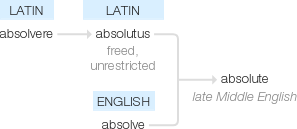Absolute
late Middle English: from Latin absolutus ‘freed, unrestricted’, past participle of absolvere (see absolve).
wiktionary
First attested around 1380. From Middle English absolut, from Middle French absolut, from Latin absolūtus(“unconditional; unfettered; completed”), perfect passive participle of absolvō(“loosen, set free, complete”), from ab(“away”) + solvo(“to loose”). [1] Influenced in part by Old French absolu. [2] Compare absolve.
etymonline
absolute (adj.)
late 14c., "unrestricted, free from limitation; complete, perfect, free from imperfection;" also "not relative to something else" (mid-15c.), from Latin absolutus, past participle of absolvere "to set free, acquit; complete, bring to an end; make separate," from ab "off, away from" (see ab-) + solvere "to loosen, untie, release, detach," from PIE *se-lu-, from reflexive pronoun *s(w)e- (see idiom) + root *leu- "to loosen, divide, cut apart."
Sense evolution probably was from "detached, disengaged" to "perfect, pure." Meaning "despotic" (1610s) is from notion of "absolute in position;" absolute monarchy is recorded from 1735 (absolute king is recorded from 1610s). Grammatical sense is from late 14c.
Absolute magnitude (1902) is the brightness a star would have at a distance of 10 parsecs (or 32.6 light years); scientific absolute value is from 1907. As a noun in metaphysics, the absolute "that which is unconditional or free from restriction; the non-relative" is from 1809.
